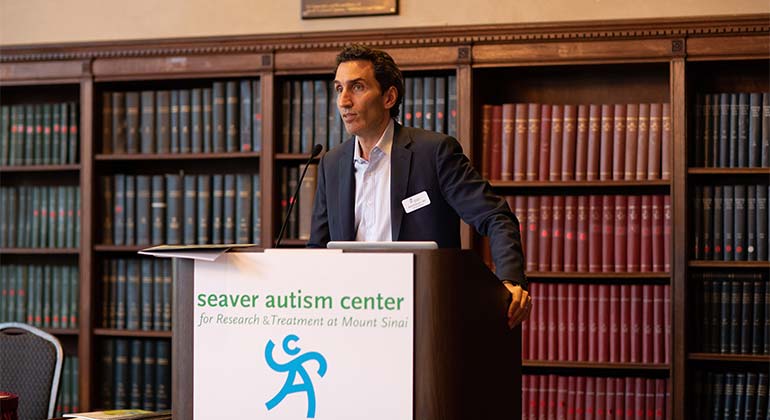
Research
At Mount Sinai, we work hard to make a difference. The Icahn School of Medicine at Mount Sinai operates research institutes, centers, and laboratories in child behavioral health. We strive to translate basic scientific advances into improvements in patient care. The Mount Sinai Hospital and Icahn School of Medicine have pioneered a number of significant breakthroughs, particularly in the area of personalized medicine.
Our Child Behavioral Health and Science Center offers specialized programs and services, all informed by the latest research. In each of these, we bring together an internationally recognized team of experts, including researchers and physicians. Our research focuses on ADHD; autism; eating and weight disorders; depression, anxiety, and mood disorders; and OCD, tics, and Tourette disorder. In addition to these, we also collaborate with programs in other areas including psychotic and substance use disorders.
ADHD and Learning Disorders
ADHD and learning disorders are complex. At Mount Sinai, we are working to understand the causes and treatments for these conditions. The Center of Excellence in ADHD and Related Disorders studies developmental neurobiology, pathophysiology, psychopathology, and treatment of ADHD and related disorders. We use evidence-based pharmacologic and psychosocial treatments and state-of-the-art techniques, such as neuroimaging and genetics.
We use a variety of advanced approaches, including genetic testing, brain imaging, and medication trials to try to understand ADHD and learning disorders. We work to ensure that everything we learn in the lab helps us improve the lives of our patients.
Autism Spectrum Disorder
The Seaver Autism Center for Research and Treatment focuses on exploring the causes and treatments of autism. The Seaver Autism Center is a major player in the field at every stage, from laboratory and clinical research to training and community outreach.
Our researchers come from diverse backgrounds and use state-of-the-art molecular, genetic, neurobiological, and clinical approaches. We work with specialists in genetics, experimental therapeutics, and cognitive neuroscience for a truly multidisciplinary effort. Our main areas of research include genetics, autism model systems, and experimental therapeutics (clinical trials, behavioral interventions, and neuroimaging).
Depression and Anxiety Disorders
The Depression and Anxiety Disorders program encompasses both research and patient services. Our research program focuses on developing effective, short-term treatments for childhood anxiety and mood disorders. We are also working to identify how the disorders develop, so we can find problems early and offer prevention services. We work closely with experts from the Icahn School of Medicine, the Nathan Kline Institute for Psychiatric Research, and the Weill Cornell Medical Center. We use a variety of advanced techniques, including functional magnetic resonance imaging, magnetic resonance spectroscopy, and immunological and genetic assays. These techniques allow us to explore the neurological and immunological mechanisms that help develop and maintain pediatric mood disorders.
Eating and Weight Disorders
At the Eating and Weight Disorders Program, we study all types of eating disorders. We specialize in developing and testing treatments such as cognitive behavioral therapy (CBT), family-based therapy, and guided self-help. Current studies focus on using smartphone-assisted CBT and mirror exposure therapy for significant body image disturbance among males and females with binge eating or bulimia nervosa.
In addition, we aim to understand how appetites and hormones contribute to eating disorders. Our goal is to enhance existing treatments and develop new ones. We use a range of neuroendocrine, imaging, and technology-assisted approaches.
OCD, Tics, and Tourette Disorder
The OCD, Tics, and Tourette Disorder program focuses on neurobiology, genetics, clinical phenomenology, and treatment of OCD, tics, and Tourette disorder. We are working to discover the causes of these disorders and develop more effective therapies to help patients and their families. We are involved with treatment studies in OCD and related disorders, international collaborations focused on identifying environmental and genetic risk factors for OCD and related disorders, and neuroimaging studies for youths and adults.